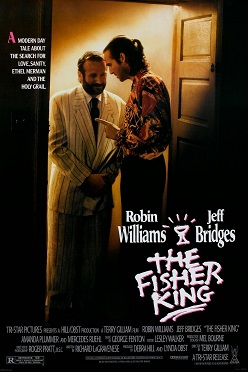Plot
Jack Lucas, a narcissistic, misanthropic shock jock, dismisses a disturbed regular caller, Edwin, over his infatuation with a woman he met at a Manhattan restaurant. Jack brashly describes her social circle as a vain enemy to people like Edwin that "must be stopped before it's too late." Meanwhile, Jack has an equally vain girlfriend, a high-rise penthouse apartment, and is being considered for the lead in a comedic TV pilot. While practicing a line read at home, he turns on a news report and discovers, to his horror, that his comments spurred Edwin to commit a mass murder–suicide at the restaurant.
Three years later, Jack works for his new girlfriend, Anne, in her video store. He is mostly drunk, depressed, and fearful of being recognized. One night, while on a bender, he is moments from suicide. Teenage punks attack him, nearly setting him on fire after mistaking him for a homeless person. Parry, a delusional homeless man, rescues Jack, claiming cherubs have tasked him with finding the Holy Grail.
Parry tries to enlist Jack's help in retrieving the Grail. He recounts the legend of God charging the Fisher King with finding the Holy Grail, but the King receives an incapacitating wound for his sin of pride: "A Fool asks the King why he suffers, and when the King says he is thirsty, the Fool gives him a cup of water to drink. The King realizes the cup is the Grail and asks, 'How did you find what my brightest and bravest could not?' The Fool said, 'I don't know. I only knew that you were thirsty.'"
Jack is initially reluctant but agrees after learning his role in Parry's current condition. Parry, whose real name is Henry Sagan, had been a teacher at Hunter College. After witnessing his wife's death during Edwin's massacre, Henry suffered a psychotic break and became catatonic. Upon awakening, he assumed the persona of Parry and became obsessed with the Fisher King's legend. As Parry, reality panics him, and he is continually haunted by a hallucinatory Red Knight, born from a distorted memory of his wife's face exploding from a shotgun blast.
Jack seeks redemption by helping Parry find love again. Lydia, a shy woman Parry admires, is first sent a cabaret telegram performed by a homeless singer, inviting her to Anne's video store. There, she is encouraged to meet Parry and join Jack and Anne for dinner. Afterward, Parry walks Lydia home and declares his love, having observed her for months. She reciprocates, but Parry's new romance summons the Knight. Fleeing his vision, memories of his wife's murder, and his institutionalization, he is ambushed by the teenage punks. Beaten and knifed, Parry becomes catatonic again. Jack, feeling whole after "saving" Parry, breaks up with Anne and begins to rebuild his career, though he experiences a crisis of conscience during a business meeting after ignoring the homeless cabaret singer's outreach.
Eventually, Jack discovers Parry's condition. Determined to help his friend, he dons Parry's clothing, infiltrates the Upper East Side castle of a famous architect, and retrieves a trophy Parry believes to be the real Grail. During the theft, Jack finds the architect unconscious from a suicide attempt. He triggers the alarm while leaving, alerting authorities and saving the man's life.
Jack brings the "Grail" to Parry, who regains consciousness and says he is ready to miss his wife. Lydia visits Parry in the hospital and finds him awake, leading the ward patients in a rendition of "How About You?" with Jack. Parry and Lydia embrace. Jack reconciles with Anne, professing his love; she slaps him, then grabs and kisses him. That night, Jack and Parry lie naked in Central Park, gazing at the clouds and a fireworks display over New York.
Production
In an episode of The Directors, Gilliam stated he was motivated to make this film after the experience of his previous movie, The Adventures of Baron Munchausen . That film, a big-budget special-effects production, had gone significantly over budget, costing more than $45 million—nearly double the $24 million budget of The Fisher King. This project also marked two firsts for Gilliam: it was the first film he directed without being involved in writing the screenplay, and his first not to feature any other members of Monty Python.
Also per The Directors, Gilliam conceived the scene where Robin Williams shadows Amanda Plummer through a waltzing crowd in Grand Central Terminal. He felt the original scene, written by LaGravenese, in which a homeless woman's beautiful singing voice fills a crowded subway, was not working. Gilliam initially hesitated to change it, wanting to remain faithful to the script and concerned the waltz would make the film feel too much like "a Terry Gilliam film." The scene was ultimately shot in a single night using a mix of professional extras and actual train passengers.
